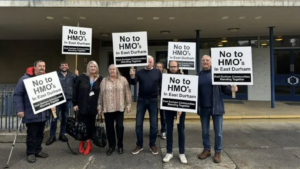Private rental market failing tenants, report says
 The private rental market is failing tenants and must be reformed, a new report has argued.
The private rental market is failing tenants and must be reformed, a new report has argued.
The report, published by the Institute for Public Policy Research (IPPR), argues that the government should do more to improve and regulate private rental for tenants as the private rental sector has grown substantially in recent years.
Among the suggestions the report makes include the reform of Universal Credit, the introduction of a ‘national landlord register’, and increasing the control tenants have over their homes.
‘Tenants face unaffordability, poor conditions, a lack of tenure security and limited control over the place they call home,’ the report says.
‘Meanwhile, cuts to benefits and welfare reform, a slow court system and a lack of strategic policy mean that the structural foundations which are essential for a thriving sector are being eroded.’
The private rental sector now accounts for 4.7 million households, making up 20% of homes in the UK.
However, the IPPR has said that the rules underpinning the sector have not kept up with its growth, meaning that renters are insufficiently protected from high rents, poor quality homes and the threat of eviction.
IPPR’s research found that the median private rent would be unaffordable to people on low incomes in 62% of local authorities and in 52% to those on middle incomes.
27% of private rented homes fail to meet the decent homes standard, while one in 10 tenancies come to an end due to termination by a landlord.
Tenancies ended by landlords were found to be the biggest cause of homelessness acceptances by local authorities in 2017, accounting for 28% (16,320) of all acceptances.
The report also highlighted well-documented problems with Universal Credit as around half of landlords with tenants in receipt of Universal Credit have experienced rent arrears.
Meanwhile, recent legal aid reforms have slashed support for tenants, with housing cases dropping by half since the reforms were introduced and one million people now living without access to housing advice.
The result is that over half of people spoken to in a Sky Data poll believe private rental to be ‘very’ or ‘fairly’ unfair to tenants, while just 19% believe it is fair.
‘Most people believe the current system of private renting is unfair to tenants, providing them with neither a stable nor an affordable home,’ the report found.
Reforms the IPPR have called for to the private rental sector include reforming Universal Credit to better support tenants and introducing a ‘property MOT’ run by local authorities for private rental properties.
The institute has also urged the government to cap rent increases, end the use of Section 21 notices relating to no-fault eviction and establish a specialist housing court.
Finally, it has called for local authorities to be given the funds to purchase private rented properties and boost local housing stock.
The National Landlords Association (NLA), which represents private residential landlords, has said that the IPPR’s recommendations for changes to the private rental sector are ‘mixed at best’.
Meera Chindooroy, the NLA’s policy and public affairs manager told NewStart that while it agreed that the court and benefit systems needs reform, most of the IPPR’s recommendations do not tackle the underlying issues in the sector and the government should concentrate on ensuring that enough new houses are built.
‘With a lack of social housing and many unable to afford to buy, more people are looking to the private rental sector to make their home,’ she said
‘It’s essential the supply is there to meet this demand.’
















